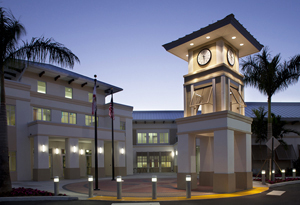The piercing cries of vividly plumed peacocks are raising questions about what animals besides horses should be allowed along for the ride in Wellington’s equestrian areas.
Complaints about non-horsey critters, ranging from peacockian disturbances of the peace to alleged slaughterhouse operations involving chickens or wild boars, prompted village staff to bring the matter before Wellington’s Equestrian Preserve Committee on Wednesday, April 12.
“The village, over the last year or so, has received a number of complaints, not a large number, about, actually, peacocks,” said Robert Basehart of the village’s Planning, Zoning & Building Department. “Today, basically peacocks would be considered a farm animal, and they would be allowed.”
Still, state and local regulations don’t always specify every permitted animal in some sort of Noah’s Ark checklist. So, the question before the panel was whether clarifying action might be helpful.
It is the sort of issue that provides reminders of the distinctive blend of suburban and pastoral elements that in so many ways define Wellington. At more than 65,000 residents, it has been ranked as Florida’s largest “village” by population in recent years. Yet part of the undeniable attraction for many is its proximity to horse farms and trails that make it a place where billionaires and future kings might care to spend some time.
A seven-page report by staff laid out the issues at hand.
In the last four years, there have been 52 animal-regulation complaints in Wellington, and at least five of these have originated in the equestrian area, according to the report. Some highlights:
In 2020, there were complaints about chickens being raised and slaughtered on a property in the equestrian area. Disposition: Case closed because raising chicken is a permitted use, and no evidence of a slaughterhouse could be found.
In 2021, complaints alleged pigs or wild boars were being raised on a property. Disposition: Raising pigs is permitted, and no evidence was found of wild boars.
In 2022, complaints said a property owner’s goats were wandering uncontrolled into neighbors’ territory. Disposition: The property owner agreed to put up a fence.
Then came the matter of peacocks.
“Wellington has always considered peacocks to be legitimate farm animals,” the report noted. “Although seldom specifically mentioned, peacocks have traditionally been allowed and considered farm animals in all codes that we have reviewed. However, complaints received by Wellington relating to farm animals include objections to allowing them. Primarily, objections relate to the noise they make.”
The staff’s research concluded that peacocks have been “part of farm life for centuries. They are not raised for their meat or eggs. However, they can be considered to be the agricultural industry’s first security system. They have keen senses of sight and smell and make considerable noise when a perceived threat is in the area (wolves, coyotes, foxes, etc.).”
Members of the committee asked how many complaints there had been about peacocks, in particular. Three to five over time, Basehart said.
“I have the perfect story for this,” said Jane Cleveland, the committee’s chair. “I have a horse farm in Loxahatchee Groves. It’s a lot more rural up there. Next door is a farm for exotic animals. I kid you not.”
She proceeded to name some of the neighboring creatures.
“Zebras, monkeys, elk, gazelles, parrots, you name it,” she said. “The guinea fowls come over, and they’re super loud.”
Yet a barking dog turns out to be the biggest nuisance, she said.
“I don’t know how in my world you could go after one animal and not the other,” Cleveland said.
Village Attorney Laurie Cohen noted that one option is to let neighbors take action on their own, perhaps by going to court.
“For individuals who do believe they are causing a nuisance, they have a private course of action,” Cohen said.
For now, a will to address the peacock issue with recommendations to village authorities failed to materialize among committee members. The seven-member panel voted unanimously to take no action.
“If there are only five or six complaints over four years, I don’t see any reason to do anything about it,” Committee Member Carlos Arellano said.
Meanwhile, an issue not on the immediate agenda but expected by June concerned the pending plan called “Wellington 3.0” to develop parts of the equestrian area with residential and commercial proposals.
Cleveland said she had been approached by supporters of the plan to meet outside of formal committee meetings, but she felt uncomfortable doing so.
“My line is I tell people to come to the meetings,” she said. “That’s why I want it to happen here and not at Starbucks.”
Cohen advised members that they could meet with interested parties outside scheduled meetings but were obliged to disclose that publicly and should not form opinions about a proposal before it had been heard in the agreed-upon civic forum.








